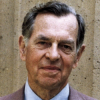Joseph Campbell

Joseph Campbell
Joseph John Campbellwas an American mythologist, writer and lecturer, best known for his work in comparative mythology and comparative religion. His work covers many aspects of the human experience. His philosophy is often summarized by his phrase: "Follow your bliss."...
NationalityAmerican
ProfessionAuthor
Date of Birth26 March 1904
CountryUnited States of America
inspirational truth important
Myth is much more important and true than history. History is just journalism and you know how reliable that is.
years play understanding
Now all the myths that you have heard and that resonate with you, those are the elements from round about that you are building into a form in your life. The thing worth considering is how they relate to each other in your context, not how they relate to something out there-how they were relevant on the North American prairies or in the Asian jungles hundreds of years agon, but how they are relevant now-unless by contemplating their former meaning you can begin to amplify your own understanding of the role they play in your life.
intuition force
You've got to find the force inside you.
lying pouring energy
Mythology helps you to identify the mysteries of the energies pouring through you. Therein lies your eternity.
ocean sleep eye
Just think, Vishnu sleeps in the cosmic ocean, and the lotus of the universe grows from his navel. On the lotus sits Brahma, the creator. Brahma opens his eyes, and a world comes into being, governed by an Indra. Brahma closes his eyes, and a world goes out of being. The life of a Brahma is 432,000 years. When he dies, the lotus goes back, and another lotus is formed, and another Brahma. Then think of the galaxies beyond galaxies in infinite space, each a lotus, with a Brahma sitting on it, opening his eyes, closing his eyes.
moving awe
Awe is what moves us forward.
age needs stories
Myths are stories for our search through the ages for truth, for meaning, for significance. We all need to tell our story and to understand our story. We all need to understand death and to cope with death, and we all need help in our passages from birth to live and then to death. We need for life to signify, to touch the eternal, to understand the mysterious, to find out who we are.
circles generations tails
Sometimes the serpent is represented as a circle eating its own tail. That’s an image of life. Life sheds one generation after another, to be born again. The serpent represents immortal energy and consciousness engaged in the field of time, constantly throwing off death and being born again. There is something tremendously terrifying about life when you look at it that way. And so the serpent carries in itself the sense of both the fascination and the terror of life.
mother father parent
There have been systems of religion where the mother is the prime parent, the source, and she's really a more immediate parent than the father, because one is born from the mother...so that the image of the woman is the image of the world.
stories
Everything starts with a story.
soul language folktales
The folktale is the primer of the picture-language of the soul.
eye simple garden
The unfolding through time of all things from one is the simple message, finally, of every one of the creation myths reproduced in the pages of these volumes-including that of our contemporary biological view, which becomes an effective mythic image the moment we recognize its own inner mystery. By the same magic, every god that is dead can be conjured again to life, as any fragment of rock from a hillside, set respectfully in a garden, will arrest the eye.
christian kings believe
You don't have to believe that there was a King Arthur to get the significance of those stories, but Christians say we have to believe there was a Christ, or the miracles don't make sense.
hurt writing perfect
And then he says, "The writer must be true to truth." And that's a killer, because the only way you can describe a human being truly is by describing his imperfections. The perfect human being is uninteresting - the Buddha who leaves the world, you know. It is the imperfections of life that are lovable. And when the writer sends a dart of the true word, it hurts. But it goes with love. This is what Mann called "erotic irony," the love for that which you are killing with your cruel, analytical word.